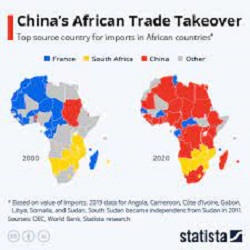Africa offers vast investment opportunities for Asian countries with the appropriate incentives for their private sectors, Prof. Kevin Urama, Chief Economist and vice president of the African Development Bank Group, has affirmed.
Urama made the call during a webinar to discuss the 2023 edition of the African Economic Outlook report. The African Development Bank organized the session jointly with the Korea Institute for International Economic Policy (KIEP) in Sejong-Si, Korea.
“I invite investors and governments in Asia to see Africa not as a distant land, but a continent full of opportunities,” said Urama, Vice President for Economic Governance and Knowledge Management. He based his recommendations on the data in the latest edition of the African Economic Outlook, a flagship annual publication of the Bank Group that reviews the economies of the 54 African countries and provides detailed forecasts.
The report shows that Africa has remained broadly resilient despite experiencing significant shocks, particularly from the Covid-19 pandemic, climate change, and the Russian invasion of Ukraine. From an economic growth of 3.8% in 2022, the continent is set to climb to 4.1% in 2023 and 2024, exceeding the global average by 2.9% and the European average by 1.1%, according to the report, which estimates that growth in Asia would be higher, at 4.3%.
Urama said, “Africa must play a key role in the green transition, given that it is home to 60% of the world’s unexploited arable land and the minerals needed for green growth.” He said these resources could stimulate sustainable development and investments. “This is virgin land, which can be easily used to build low-carbon infrastructure without large-scale expenditure.”
Edmond Wega, the Bank Group’s Executive Director for Canada, China, South Korea, Kuwait and Turkey, said Asian investors must look beyond unfavourable depictions of Africa to seize investment opportunities in Africa.
“Asia needs to use its technologies and knowledge to build a win-win relationship with Africa and work with its regions, countries and the African Development Bank to achieve a convergence and turn dreams into a reality,” he stated.
Sung-Chun Jung, vice president of KIEP, highlighted Africa’s vast potential for green growth, considering its fast-growing population and abundant renewable energy and natural resources.
“The international community must provide strong support for the efforts by African countries to combat climate change, particularly through funding, technology transfers and capacity building,” he said, adding that the private sector must play a more significant role in covering the funding gap to tackle climate change.
There was a round table featuring Hong Miao, an energy expert and programme director at the World Resources Institute in China; Sungbae An, Director of the Department of Macroeconomics and International Finance at the KIEP; and Kohji Mitomori, Director of the Office for Climate Change in the Global Environment Department of the Japanese International Cooperation Agency (JICA). Munsu Kang, associate researcher at the KIEP, moderated the discussion.
Ms Hong Miao emphasized that Chinese investors and businesses were keen to work with other countries under the Organisation for Economic Co-operation and Development umbrella to invest and commit to economic development in Africa, particularly concerning green growth and renewable energies.
She stated, “A large number of private Chinese investors are already present in Africa, and the bilateral development banks also have a role to play, given the numerous innovative opportunities that exist for engaging with more private investors. Efforts must be made on both sides, in Asia and Africa.” Miao made the remarks after presenting a study on Chinese investors’ enthusiasm for Africa, particularly in renewable energies.
Sungbae pointed to the KIEP’s economic forecasts, assuming 3.7% growth in sub-Saharan Africa in 2023. “One of the key problems we have identified is inflation, driven by the increase in food prices and staple goods, the pressure associated with rising exchange rates and political unrest,” he said.
Kohji Mitomori said Japan was set to double its contribution to climate adaptation by 2030. The event marks the fourth consecutive year of presenting the African Economic Outlook report in Asia. The African Development Bank Group has an External Representation Office for Asia based in Japan.
Asian Countries Investments in Africa
Over the past two decades, there has been a significant increase in Asian investment in Africa. This trend can be attributed to several factors, including the rapid economic growth experienced by many Asian countries, the availability of natural resources in Africa, and the desire to access new markets and diversify investment portfolios.
China has been one of the most prominent Asian investors in Africa. Through its Belt and Road Initiative (BRI), China has been actively involved in infrastructure development projects across the continent. These projects include the construction of ports, railways, roads, and power plants. China’s investments in Africa have also focused on sectors such as mining, manufacturing, agriculture, and telecommunications.
India is another Asian country that has increased its investment in Africa. Indian companies have been particularly active in sectors such as pharmaceuticals, information technology, telecommunications, and agriculture. The Indian government has also provided financial assistance to African countries through lines of credit and grants.
The report stated that other Asian countries, including Japan, South Korea, and Singapore, have also shown interest in investing in Africa. Japanese companies have been involved in infrastructure projects, particularly in the energy sector. South Korean companies have invested in sectors such as construction, manufacturing, and technology. Singaporean companies have focused on sectors such as finance, logistics, and real estate.
